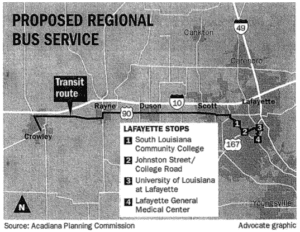Is Lafayette Municipal Transit worth the cost?
LCG is expanding the $5 million taxpayer funded programLafayette Transit Expanding Costs
- The Lafayette Municipal Transit System cost $5,074,317 last year.1
- Taxpayers subsidized the system by $4,616,2311 (or 91% of the total)
- Ridership fees for service were only $458,086.1
- Based on an average rider fee of $1.67,2-2 we estimate there were only 274,303 paid riders.
- 1,546,244 Unlinked Passenger Trips (UPT)3 to paid riders estimates a bus made 6 trips per paid fare.
- Total cost per ride: $18.50,5 or a 10:1 taxpayer to rider funding ratio.
- Excluding Federal & State subsidies, every rider cost Lafayette taxpayers $10.24.6
The Details:
Although an important service, a quick analysis reveals Lafayette Transit is one of the top expenditures in local government. Last year, the total cost to operate Transit was $5,074,317. Subtracting the $458,086 in fees for service leaves the taxpayers to pick up the remaining $4,616,231. There are some state and federal subsidies that help but Lafayette’s share is still $2,807,596.
Those are pretty big number for most of us to digest, so let’s break it down to the more manageable cost-per-transaction. For simplicity, we’ll use the system’s discounted rate of $1.672-2 per ride against the $458,0861 in fees for service generated. We can arrive at 274,303 paid fares by simply dividing one number by the other. If we were to use the full $22-2 rate, ridership would be in a somewhat less attractive position of 229,000.
Using that 274,303 paid riders estimate we can arrive at all kinds of other numbers. For example, dividing Lafayette’s share by the ridership number gets us to the $10.246 it costs the Lafayette taxpayer every time someone takes the bus. If we instead use the $5 million1 total program cost as our dividend, we can find a $18.505 total system cost for every rider. Contrast these with the $13 national average for a LYFT or Uber ride. 7
Return on Investment
 These seemingly considerable negative financial returns aren’t discouraging the planners from working to expand the program, however. On July 10th, the Lafayette City/Parish Council approved ordinance O-105-2018,2 allocating an additional $166,0002-1 to create a pilot commuter bus route linking Acadia Parish and Lafayette Parish. If successful, the Acadiana Planning Commission is eyeing other routes, as Deidra Druilhet pointed out to KATC reporters not so long ago. “An overall goal that we’re looking at is creating an opportunity for regional transit that would serve not only Acadia Parish, but St. Martin Parish, St. Landry Parish, Iberia Parish, things of those natures. We want to look at the capability of connecting all of the Acadiana parishes,” said Druilhet.
These seemingly considerable negative financial returns aren’t discouraging the planners from working to expand the program, however. On July 10th, the Lafayette City/Parish Council approved ordinance O-105-2018,2 allocating an additional $166,0002-1 to create a pilot commuter bus route linking Acadia Parish and Lafayette Parish. If successful, the Acadiana Planning Commission is eyeing other routes, as Deidra Druilhet pointed out to KATC reporters not so long ago. “An overall goal that we’re looking at is creating an opportunity for regional transit that would serve not only Acadia Parish, but St. Martin Parish, St. Landry Parish, Iberia Parish, things of those natures. We want to look at the capability of connecting all of the Acadiana parishes,” said Druilhet.
###
- CAFR 2017 (Page 151)
- Ordinance O-105-2018 (Page 3) (Page 25)
- Lafayette Transit System Ridership Activity Report (2017)
- CAFR 2017 (Page 151) $4,616,231 is calculated at $5,074,317 total Transit budget minus $458,086 charges for service.
- To calculate $18.50, use $5,074,3171 and divide by 274,303 paid riders.
- $10.24 is calculated using $2,807,596 transferred from the General Fund (CAFR 2017 Page 151)
- Time, Inc. Money – Uber and Lyft Per Trip


